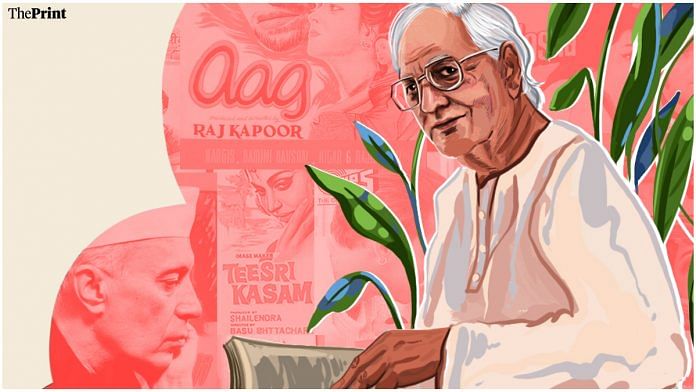Asrar ul Hasan Khan, born to a police constable whose roots were in the Sultanpur district in Uttar Pradesh, was known to the world as ‘Maj-rooh’ — his pen name, meaning ‘wounded soul’ — and who rose to become a celebrated colossus. In 1993, Majrooh Sultanpuri was awarded the Dadasaheb Phalke Award, becoming the first lyricist to win the highest honour in cinema.
In 1980, he was given the Ghalib Award for his literary accomplishments. Two other major awards he cherished were the Madhya Pradesh government’s Iqbal Samman Award in 1992— again, he was the first winner among film writers — for Urdu creative writing and from Maharashtra, his karmabhoomi, the Sant Dnyaneshwar Award for his contribution to the arts.
‘Naseh’ to ‘Majrooh’
Majrooh, by qualification, was a Unani medical practitioner who also treated patients for a while before his poetic inclinations took him mushaira-wards. His original pen name was ‘Naseh’ — sincere adviser. In Mumbai, he participated in a competition to write lyrics for A.R. Kardar’s Shahjehan (1946). He won—and the rest is a 55-year history.
After Shahjehan and its music proved a hit, Majrooh decided to stay on, as his compensation allowed him a decent living even after marriage. The fact that K.L. Saigal wished the song Jab dil hi toot gaya to be played on his last journey in itself is a marker of Majrooh’s genius as someone trying to find his feet in the industry.
He wrote last for Mere Biwi Ka Jawaab Nahin and Ek Se Badhkar Ek (both released in 2004). There were six more projects he was working on when he died. Majrooh effortlessly penned everything from light lyrics to heavy-duty poetry in cinema.
Also read: How did Laxmikant-Pyarelal end Shankar-Jaikishan era in Bollywood? Happier, cheaper music
Making friends
In the aftermath of Independence, when Majrooh joined the Communist Party of India — fundamentally made up of agnostic people — Naushad, who composed his Shahjehan and Andaz and was a devout Muslim, stopped working with him. It took 20 years for Naushad and Majrooh to resolve their issues and come together for the memorable score of Saathi (1968). Later, Majrooh’s daughter Saba even wed Naushad’s son Raju.
During the traumatic post-Independence phase, Jaddanbai Hussain, Hindi actress Nargis’ mother, offered him shelter and Majrooh soon became a trusted friend. He once escorted Nargis to the sets of Raj Kapoor’s Aag (1948). Raj, on a whim, asked him to write a song for it. Majrooh wrote Raat ko ji chamke taare and refused to accept money for it.
In 1949, when Majrooh was jailed for his anti-Nehru writings, Raj Kapoor, knowing the poet’s immense sense of self-respect, visited him and gave him an imaginary song situation to write on. When Majrooh penned Duniya banane wale kya tere man mein samayi, Kapoor paid him Rs 1,000 for it when the highest-paid lyricists at the time would get only Rs 250. In 1966, the actor used the song with Hasrat Jaipuri writing new situational antaras for it in Majrooh’s friend, lyricist Shailendra’s production Teesri Kasam.
Not many know that Majrooh Sultanpuri replaced Sahir Ludhianvi in Tumsa Nahin Dekha (1957) despite the latter having already recorded the title song, because writer-director Nasir Husain had strong differences with him. Ludhianvi would chastise Husain for making a flippant commercial film, unlike Guru Dutt. “I do not want to be another Guru Dutt!” thundered Husain. He threw Ludhianvi out and brought in Majrooh, who wrote for his films for over 30 years.
Ironically, it was Guru Dutt who first asked Majrooh to forgo correct grammar for the sake of popular appeal in the song Sun sun sun sun zalima because O.P. Nayyar’s tune was very catchy. “It was also the first of many songs with Nayyar and R.D. Burman where I had to change my words to fit their sense of rhythm,” recalled the frank and forthright songwriter. “But their music had so much scope for poetry!”
Majrooh gave the example of his hit song Waadiyaan mera daaman from R.D. Burman’s Abhilasha as proof. “In the Vedas, a woman is compared to dharti (earth) and in the Quran to kheti (field), so I wrote Waadiyaan mera daaman / Raaste meri baahein / Jaao mere siva / Tum kahaan jaaoge.”
Also read: From Tezaab to Total Dhamaal, Madhuri Dixit’s ‘Diva-ine’ force continues to dazzle
Young at heart
Majrooh’s compositions adorned over 250 films, and although he worked mostly with R.D. Burman, Laxmikant-Pyarelal, S.D. Burman and O.P. Nayyar—among most of the legends, he went on to associate frequently with youngsters like Rajesh Roshan, Anu Malik, Anand-Milind and Jatin-Lalit.
Few are aware that Majrooh wrote lyrics for India’s first film made in stereophonic sound—V. Shantaram’s Jal Bin Machhli Nritya Bin Bijli (1971). Majrooh developed a high regard for the filmmaker. “He (Shantaram) wanted poetic songs from me without compromise. The music was by Laxmikant-Pyarelal, who, along with the late Roshan, are the only composers who never changed a word of what I wrote to suit the tune. They would modify their composition instead!”
Majrooh also rated Jal Bin… and Roshan’s Mamta (1966) as his two most satisfying films. He also praised Rajinder Singh Bedi for choosing his ghazal, Hum hain mataa-e-kooncha-o-bazaar ki tarah for its literary value, “getting it beautifully tuned by Madan Mohan for Dastak” and delivering a popular hit in which listeners “were forced to hunt for the song’s meaning.”
It was Lata Mangeshkar who had strongly recommended Majrooh’s name to V. Shantaram and her sister Asha Bhosle who told composer Leslie Lewis that she would do his pop album Jaanam Samjha Karo (1997) only if Majrooh wrote the songs.
In the late 1990s, Majrooh had once told me, “I don’t think I have done anything extraordinary.” I call it the understatement of the century.
Rajiv Vijayakar is a film and music journalist, critic and author. He tweets @rajivvijayakar. Views are personal.
(Edited by Humra Laeeq)



